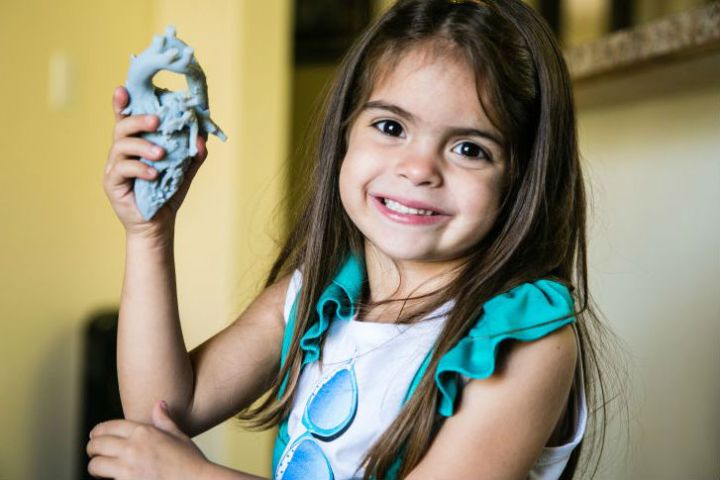
Gonzalez spent the first four years of her life battling colds, pneumonia and other respiratory problems. Doctors diagnosed her with asthma and prescribed medication to help her breath, but they soon realized asthma was not the source of her maladies. Instead, the four-year-old had a double aortic arch that was putting pressure on her windpipe, making it difficult for her to breath and to cough up phlegm when she had a cold.
The procedure to fix the aortic defect required a complicated open heart surgery procedure, which prompted surgeons at Nicklaus Children’s Hospital in Miami to turn to 3D printing to help them prepare for the surgery. The hospital earlier this year received their first 3D printer, which already was being used by surgeons to make replicas of organs. These simulated organs allowed the physicians to study the organ ahead of the surgery and even practice the procedure in advance.
Director of pediatric cardiovascular surgery Dr. Redmond Burke used this technology to produce a 3D version of Gonzalez’s heart. The surgeon carried around the model, showing it to other surgeons as he sought their advice on the procedure. After studying the child’s heart, Burke had a breakthrough that would make surgery easier for the surgeon and his patient. “Without the model, I would have been less certain about (operating on Mia) and that would have led me naturally to make a larger incision that could possibly cause more pain and a longer recovery time,” Burke said.
Burke and his colleagues at Nicklaus Children’s Hospital have used the 3D printer successfully for 25 patients with congenital heart defects. Some of these patients would have been rejected for surgery had it not been for the 3D models. The Florida hospital is one of 75 hospitals in the US and 200 worldwide that use 3D printing.
Editors' Recommendations
- 3D printed cheesecake? Inside the culinary quest to make a Star Trek food replicator
- AMD teases performance of its revolutionary 3D V-cache chip
- AMD’s 3D-stacked Ryzen 7 5800X3D is ‘world’s fastest gaming processor’
- NASA is testing a 3D printer that uses moon dust to print in space
- The best 3D printers under $500




